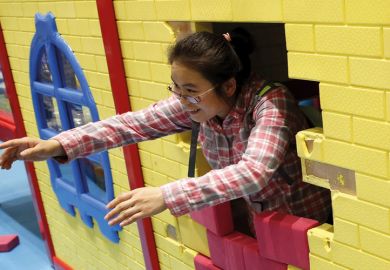Universities need to put more stress on cooperation if they want many of their female employees to work most effectively.
“As a woman who has worked across the world,” says Sun Young Lee, assistant professor of organisational behaviour at the University College London School of Management, “I’ve long observed that women take competition with other women much more personally than men take competition with other men.”
Her research on this theme forms the basis for a paper, “A relational perspective on same-gender competition”, which she has just published with Selin Kesebir and Madan M. Pillutla (both from the London Business School) in the Journal of Personality and Social Psychology.
“According to gender socialization research,” argue the authors, “female peer culture values harmony and the appearance of equality, while the male culture is more competitive.”
In highly competitive environments, it is clearly significant whether workers regard competition as “an ordinary condition of relationships” or “a violation of relational norms”. Could it be that “women see competition with their same-gender coworkers as less desirable and experience more negative emotions in response to it”?
After four separate studies involving close to 800 participants, the researchers concluded that women do indeed “experience more negative consequences when they have to compete with their same-gender peers”.
But far from confirming stereotypes about “catfights and mean girls”, the results indicated that “relational strain” is caused by “the competitively structured environment and not the inability of women to work together”.
So what does this mean in practice for employers such as universities?
Dr Lee would like to see “joint performance” and cooperative “efforts for the discipline, team or department” given far more significance in promotion (and ideally remuneration) decisions alongside individual research and teaching performance.
She also believes that a better culture can be fostered through “mandatory meetings” that offer opportunities for “friendly interaction”.
In her own school, for example, the dean has been keen to develop a “cooperative culture”. Dr Lee therefore takes part in weekly research meetings where “we are encouraged to help each other with individual problems and create joint projects, so we experience both competition and cooperation with the same set of people.
"That helps me not to be overly competitive but to think about colleagues’ welfare as well as mine. Even though I know I have to compete with them in terms of numbers of publications and teaching ratings, I feel they are more my friends than my competitors.
"Combining both elements particularly helps women have better work experiences and perform better, but it may help [relatively non-competitive] men as well.”
Register to continue
Why register?
- Registration is free and only takes a moment
- Once registered, you can read 3 articles a month
- Sign up for our newsletter
Subscribe
Or subscribe for unlimited access to:
- Unlimited access to news, views, insights & reviews
- Digital editions
- Digital access to THE’s university and college rankings analysis
Already registered or a current subscriber?







